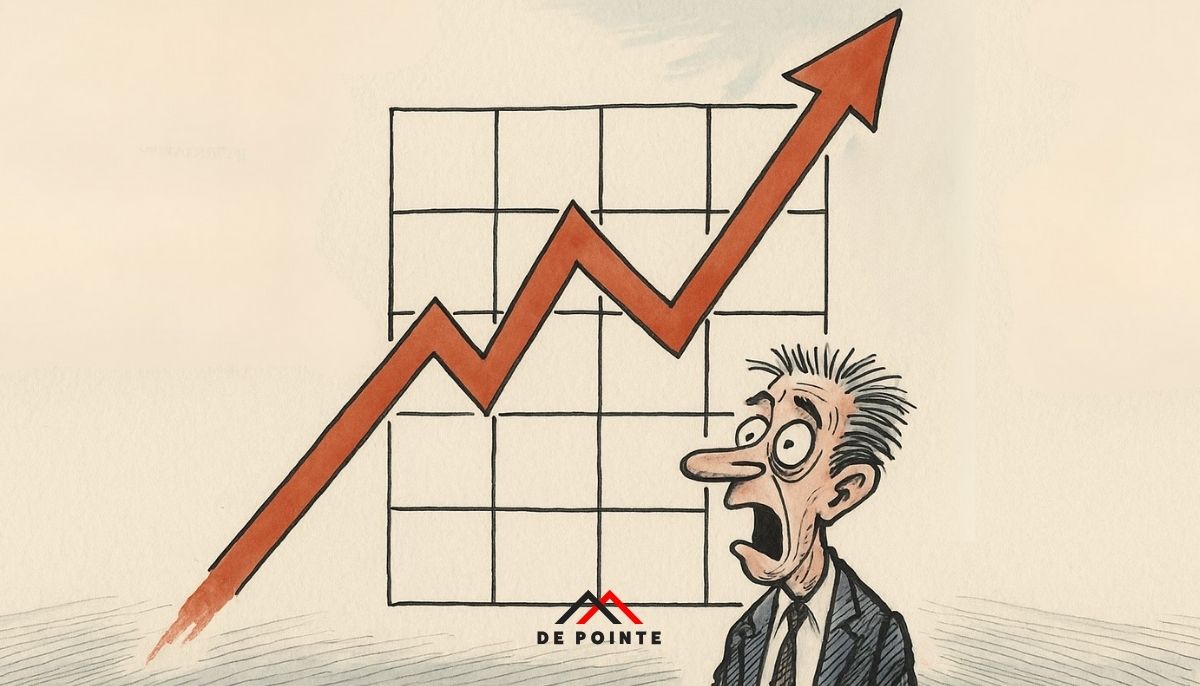Article

The latest data from the Office for National Statistics (ONS), released on 16 July 2025, has taken many economists and investors by surprise: UK inflation, as measured by the Consumer Prices Index (CPI), rose to 3.6% in June 2025, up from 3.4% in May. This represents the highest annual reading since January 2024 and signals that the inflationary pressures, far from cooling completely, may be staging a comeback.
At De Pointe Research, we continuously monitor macroeconomic trends that impact investor sentiment and strategy, especially across alternative assets. In this post, we break down what’s driving this inflation uptick, how policymakers are responding, and what it could mean for UK investors going forward.
What’s Driving the Inflation Rebound?
The return of inflationary pressure appears to be driven primarily by three sectors:
1. Food and Non-Alcoholic Beverages
Food price inflation surged again, climbing to 4.5% year-on-year, a marked acceleration from previous months.
According to the ONS, this is due in large part to:
- Rising meat, bread, and dairy prices
- Global commodity cost volatility and higher energy costs at food processors
- Persistent labour shortages across supply chains
Food and drink prices have been a persistent driver of inflation over the past two years, and June’s figures indicate the sector is far from stabilised.
2. Transport Costs
While fuel prices were falling year-on-year, the pace of decline slowed compared to June 2024. The price of petrol and diesel dropped less sharply than expected, and air travel saw seasonal price increases. Transport inflation now stands at 1.7%, and any further rise in oil prices globally could exacerbate this.
3. Services and Housing
- CPIH, which includes housing costs, rose to 4.1%, driven by increased owner-occupier housing expenses and rental growth.
- Services inflation, particularly in hospitality and insurance, remains stubbornly high, reflecting underlying wage pressures.
Core Inflation Still Running Hot
Beyond the headline CPI, core inflation—which strips out volatile items such as energy, food, alcohol, and tobacco—remains a key concern for the Bank of England (BoE).
- Core CPI rose to 3.7%, from 3.5% in May
- Core CPIH reached 4.3%, from 4.1%
This indicates inflation is broad-based, not just driven by temporary supply shocks. Wage growth, services pricing, and longer-term cost pass-throughs are sustaining higher prices.
What Will the Bank of England Do?
Markets had been pricing in a base rate cut in August 2025, potentially from 4.25% to 4.00%. But this latest inflation reading throws cold water on that assumption.
While economic activity has weakened, GDP fell by 0.3% in April and 0.1% in May, raising concerns about a recession. However, the BoE’s core mandate is to bring inflation back to its 2% target.
BoE policymaker Catherine Mann warned this week that inflation is “still a challenge” and hinted that caution will be needed before making any monetary policy adjustments.
Current expectations:
- The BoE is still likely to cut rates by 25 basis points in August, especially if wage and labour data soften.
- However, further cuts could be delayed until Q4 2025, and total cuts for the year may now be fewer than anticipated.
Stagflation Risks Are Mounting
The combination of slowing growth and persistent inflation, known as stagflation, is once again a concern. This environment is challenging for traditional investments:
- Equities may suffer under higher-for-longer interest rates
- Bonds lose value as inflation erodes real yields
- Cash becomes a losing game with real returns in negative territory
This is why many investors are turning to alternative investments—such as art, gold, private credit, or fractional property—to insulate their portfolios from macroeconomic instability.
At De Pointe Research, we advocate for diversified portfolios that include 10–20% allocation to tangible, non-correlated assets, especially during periods of inflation uncertainty.
Inflation Forecast: Where Do We Go from Here?
| June 2025 | Forecast Q3 2025 | Year-End Projection | |
| CPI | 3.6% | 3.7% (peak in Sept) | 3.1% |
| Core CPI | 3.7%0 | 3.8% | 3.2% |
| BoE Base Rate | 4.25% | 4.0% (August cut likely) | 3.75% |
| GDP Growth (YTD) | -0.2% | Flat to -0.3% | ~0.2% |
Factors influencing the trajectory:
- Global oil and food prices
- UK wage growth and employment levels
- Labour government’s fiscal stance post-election
- Consumer confidence and discretionary spending
What Should Investors Do Now?
Inflation is not going away quietly—and neither are the risks it poses to traditional portfolios. While inflation has moderated from the 2022–23 highs, persistent core price pressure, combined with weak growth, makes this a fragile moment for UK markets.
Investors should consider:
- Hedging with inflation-resistant assets (e.g. gold, art, tangible assets)
- Shifting away from bonds and overexposure to interest-rate-sensitive instruments
- Evaluating long-term stores of value that are less correlated to GDP or equity volatility
This is a key moment to reassess long-term financial strategies. Whether you’re protecting capital or seeking high-growth, low-correlation returns, alternative assets can offer the ballast needed to ride out inflationary cycles.
Get Our Full Inflation & Investment Outlook
De Pointe Research provides high-quality reports, data insights, and due diligence into the UK and global investment landscape, specialising in non-market correlated assets.
Download our latest report or speak with our research team to learn how inflation could impact your portfolio—and how to protect against it.





